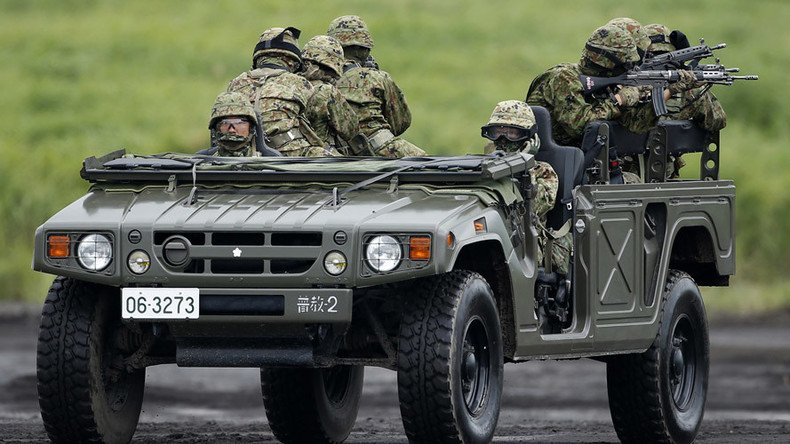Japan to spend record $41bn defense budget on spying on China & US base relocation

Japan's defense budget for the next fiscal year will hit an all-time record of 5,05 trillion yen (over US$41 billion). Tokyo plans to purchase US-made aircraft to step up its monitoring activities near the disputed Senkaku Islands in the East China Sea.
The increase in Japan's fiscal 2016 spending appears to be mainly due to equipment purchases intended to counter China’s maritime activities related to territorial claims. Since the start of Prime Minister Shinzo Abe's second administration in 2012, it will be the fourth consecutive annual increase in Japanese defense spending.
To strengthen monitoring activities in the East China Sea, Tokyo plans to purchase Global Hawk unmanned surveillance aircraft and four Osprey tilt-rotor transportation aircraft, Japanese newspaper the Asahi Shimbun reported.
The increased budget for the next 12 months (starting from April 2016) will also include funding for a controversial US military base on the southern island of Okinawa, a strategic position giving American troops and aircraft based there widespread access to East Asia. Tokyo wants to shut the current Futenma US Marine Corps air station in Ginowan City and open a new one in Henoko, in the center of the southern Japanese island.
The government’s expenditure for the realignment of US forces stationed in Japan will raise more than 30 billion yen ($247 million) from fiscal 2015, the Asahi Shimbun reported. The US Marine air station in Futenma raises safety fears at its current location as it is surrounded by homes, schools and other civilian structures. There has also been tension for years from the local population about the presence of US servicemen. This dates back to a notorious crime committed in 1995, when three US marines kidnapped and raped a 12-year-old schoolgirl.
READ MORE: ‘Marines out!’ Okinawa demonstrators mark 500th day of protest against US base (VIDEO)
Okinawa Governor Takeshi Onaga has been a staunch opponent of Prime Minister Shinzo Abe's relocation plan - he canceled a 2013 approval for the project, issued by his predecessor, saying it was not legally sound and had a number of "legal defects.” His wife joined citizens to maintain a sit-in protest in front of the gates of the US Marine Corps' Camp Schwab in an attempt to block construction of a new US base in Henoko last month.
Okinawa governor withdraws permission to relocate US military base http://t.co/g2td173Qcfpic.twitter.com/uKedxYHChL
— RT (@RT_com) 13 октября 2015About 1,000 protesters demonstrated in front of the camp, chanting “Protect the people of Okinawa, not the US base.” They demanded that the current Futenma air base should be closed and its replacement built elsewhere in Japan or overseas.
In September, the Japanese parliament finally enacted controversial legislation that would allow the country's military to fight overseas for the first time since its defeat in World War II, in defense of an ally that has come under attack. This step came despite severe criticism from the Japanese public, which called it “war legislation” aimed at turning Japan toward militarism, and warned that the new legislation would nullify nearly 70 years of efforts by Tokyo to regain international trust.
Prime Minister Shinzo Abe’s cabinet approved the legislation, however, thus enabling the country to play a greater international role. A pacifist constitution, signed by Japan after its defeat in World War II, had previously banned the use of force as a means of settling international disputes.













